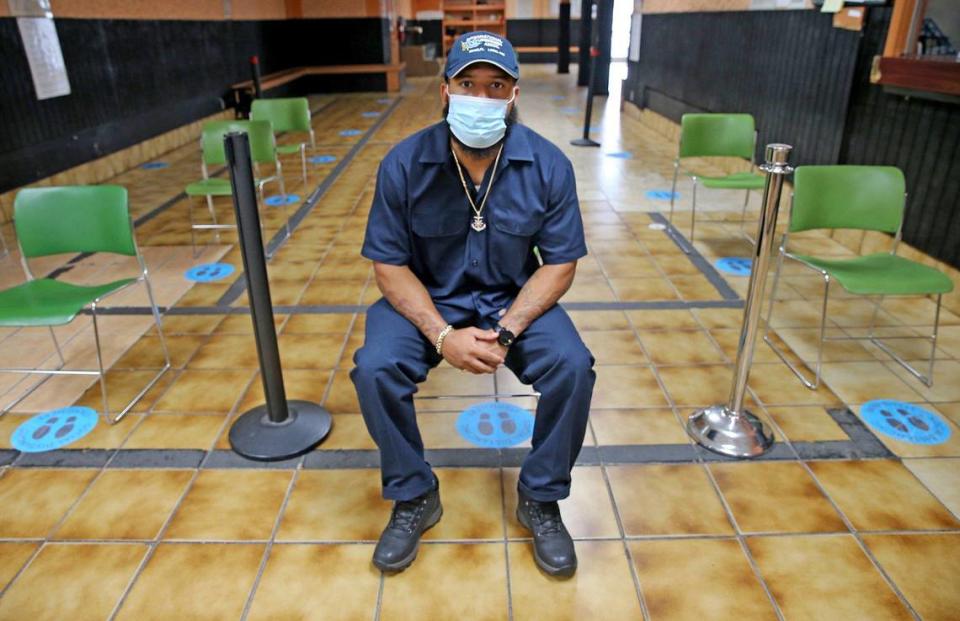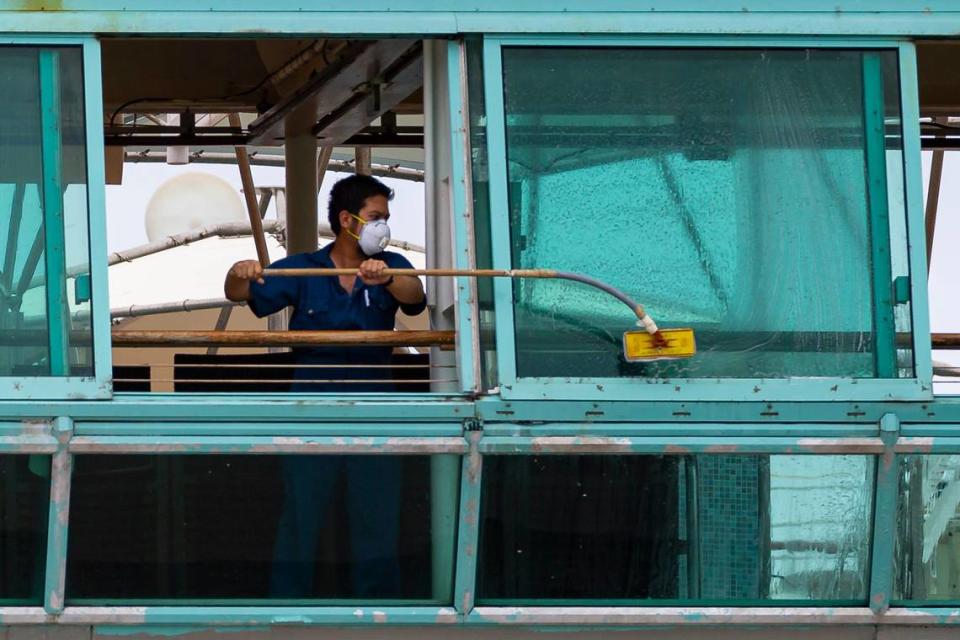‘Enough is enough’: Commissioners and cruise execs urge CDC to let cruising resume
Five months after South Florida became a hotbed for COVID-19 cruise outbreaks, Miami-Dade commissioners and cruise executives are urging the U.S. Centers for Disease Control and Prevention to give the cruise industry the OK to restart sailings as soon as possible.
At a virtual tourism and ports committee meeting Thursday, Commissioner Rebeca Sosa scolded the federal health agency charged with the country’s public health response to COVID-19, saying it has been too slow to communicate with the industry and must work quickly to get cruising up and running again. The deadly virus continues to claim thousands of American lives every week.
“The problem is it’s not fair that the CDC is not paying attention and communicating with the cruise industry,” Sosa said, citing the time between when cruise companies submitted plans to the agency regarding how to mitigate COVID-19 spread among crew in mid-April and the finalizing of those plans in late July. “We cannot wait another 14 weeks.”
The meeting, which included packaged videos promoting the cruise industry and live shots with cruise CEOs, did not touch on safety concerns. Commissioners didn’t ask executives for details about how to avoid the disease spread and complications that left hundreds of passengers at sea for weeks and the Coast Guard overwhelmed by medevac requests.
The CDC first banned cruises in the U.S. in mid-March amid COVID-19 outbreaks on several ships. The following six months have been marred by disagreements between the industry and the agency.
During the ban on cruising, companies have suffered record financial losses and had to lay off large numbers of staff. Thousands of people who support the industry, including longshoremen, shuttle drivers, industry vendors and travel agents, remain out of work. The CDC has banned cruises in the U.S. until at least Oct. 1; most companies have said they will not resume cruises in the U.S. until at least Oct 31.

Sosa and Norwegian Cruise Line Holdings CEO Frank Del Rio said cruise ships are no more dangerous than hotels or airplanes. That claim has been refuted by the CDC, which has repeatedly noted the unique challenge in preventing COVID-19 spread at sea.
“A cruise is a hotel in the middle of the ocean that the doors and windows open all the time, and we have an incredible amount of wind coming in and out making it a safer place,” said Sosa.
Said Del Rio, “It’s unconscionable what’s happened to the cruise industry. We’ve been quiet for too long.”
Two cruise companies with U.S. headquarters in Miami started cruises again in Italy this month: Carnival Corporation, with its Costa Cruises brand, and MSC Cruises. The cruises are only available for Italian passengers and all passengers and crew are undergoing COVID-19 rapid antigen tests before boarding.
Investigation
How many coronavirus cases have been linked to cruises? Check out the latest numbers
The Miami Herald investigated COVID-19 outbreaks on cruise ships. Explore the findings of the most comprehensive tracking system of coronavirus cases linked to the cruise industry.
Carnival Corp. CEO Arnold Donald said he expects the company’s AIDA brand to begin cruises in Germany soon. Del Rio said Norwegian Cruise Line Holdings will be submitting its health protocol proposal, created in conjunction with Royal Caribbean Group, to the CDC within the next 10 days.
“We’ve got to get to work,” he said. “Enough is enough. It’s been more than six months. We’ve learned a lot.”
At odds with CDC
In its most recent no-sail order, the CDC said it spent 38,000 man-hours working to manage the COVID-19 crisis on cruise ships as of July 10.
After the CDC first warned the public to avoid cruise travel because of the increased risk of COVID-19 spread on March 8, cruise companies continued to operate. Nervous passengers boarded cruises after the CDC warning because companies were not offering refunds. Companies did not screen disembarking passengers at PortMiami, in some cases after learning about previous passengers who had tested positive.
On March 13, the industry announced it was canceling all U.S. cruises. The CDC issued its industry-wide no-sail order the next day.
In March and April, several ships still carrying passengers became trapped at sea with nowhere to dock and eventually found refuge in Florida ports where dozens of passengers and crew were evacuated; some died on board before the ships arrived, others died in South Florida hospitals. At least 110 passengers and crew members have died from COVID-19, at least 38 in Florida, according to a Miami Herald investigation, and at least 86 ships have been affected — approximately one-third of the global cruise fleet.
In April, seven cruise companies submitted plans to the CDC detailing how they would protect crew from the virus while the ships were out of service. The CDC said the plans largely failed to meet the agency’s requirements to prevent the spread of COVID-19 and staffed two people to work with each company on redrafting the plans. Norwegian Cruise Line continued to house crew in shared cabins with shared bathrooms until July, according to the agency, and took more than two weeks to sign the required form confirming it has a complete and accurate plan. Most companies needed two revisions to their plans before they were deemed complete; one needed seven, the agency said.

In the interim, the CDC said cruise companies would be allowed to repatriate crew members through the U.S. using private transportation if their executives signed an agreement with the agency assuming responsibility for following all health protocols, like requiring traveling crew to wear masks. Royal Caribbean told its crew that the CDC had banned all crew repatriation, delaying sending them home. After the Herald reported the company knew the CDC was allowing for repatriation on private transportation, the company reversed and signed the required agreements.
In June, the CDC unveiled a grading system for cruise ships based on their level of infection. Ships with complete plans for preventing COVID-19 spread and no COVID-19 cases within 28 days can repatriate crew using public transportation. The only cruise company to have a complete plan at that time was Bahamas Paradise Cruise Line.
Crew continue to contract COVID-19 aboard laid-up ships, according to CDC data obtained by the Miami Herald via a Freedom of Information Act request. At least seven ships in U.S. waters during the month of August reported COVID-19 or COVID-like illnesses to the CDC that month.
Carnival Corporation pulled its ships out of U.S. waters before the grading system debuted, in part because it disagreed with the agency’s requirement that asymptomatic crew members remain in their cabins as much as possible. Virgin Voyages pulled its ship out the following week. Disney Cruise Line and Norwegian Cruise Line have now pulled most of their ships out of U.S. waters. Ships outside U.S. waters are no longer required to report illnesses to the CDC.
Hundreds of crew members are still stuck on cruise ships without pay, waiting to be repatriated. A spokesperson for Carnival Corporation said it still had 400 crew to repatriate at the start of this week, after sending home 80,000. A spokesperson for MSC Cruises said it still has around 700 waiting to go home, after repatriating more than 17,800. A spokesperson for Royal Caribbean Group said as of July 17 the company still had 2,815 people to repatriate and did not provide an update. Spokespeople for Norwegian Cruise Line Holdings did not respond to a request for comment.

